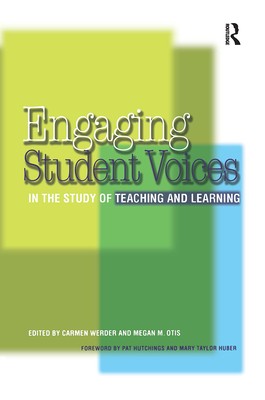
- We will send in 10–14 business days.
- Publisher: Stylus Publishing (VA)
- ISBN-10: 1579224202
- ISBN-13: 9781579224202
- Format: 15 x 22.6 x 1.5 cm, softcover
- Language: English
- SAVE -10% with code: EXTRA
Engaging Student Voices in the Study of Teaching and Learning (e-book) (used book) | bookbook.eu
Reviews
Description
"A must read for those teachers seeking to increase student engagement and to enhance each student's self-authorship in the learning process."--Barbara Mae Gayle, Academic Vice President, Viterbo University
This book addresses the all-important dimensions of collaboration in the study of learning raised by such questions as: Should teachers engage students directly in discussions and inquiry about learning? To what extent? What is gained by the collaboration? Does it improve learning, and what do shared responsibilities mean for classroom dynamics, and beyond?
Practicing what it advocates, a faculty-student team co-edited this book, and faculty-student (or former student) teams co-authored eight of its eleven chapters.
The opening section of this book explores such dimensions of student voices in the scholarship of teaching and learning (SoTL) as power and authority in the classroom, collaborative meaningmaking, and the role of students as both learners and experts on their own learning. It opens up the process of knowledge-building to a wider group of participants, and expands our conception of who has expertise to contribute - for instance recognizing students' "insider" knowledge of themselves as learners.
The case studies in the second half of the volume illustrate how these concepts play out inside and outside the classroom when students shift from serving as research subjects in a SoTL study to working as independent researchers or as partners with faculty in such work as studying curricular design/redesign, readings, requirements, and assessment.
EXTRA 10 % discount with code: EXTRA
The promotion ends in 17d.11:57:03
The discount code is valid when purchasing from 10 €. Discounts do not stack.
- Publisher: Stylus Publishing (VA)
- ISBN-10: 1579224202
- ISBN-13: 9781579224202
- Format: 15 x 22.6 x 1.5 cm, softcover
- Language: English English
"A must read for those teachers seeking to increase student engagement and to enhance each student's self-authorship in the learning process."--Barbara Mae Gayle, Academic Vice President, Viterbo University
This book addresses the all-important dimensions of collaboration in the study of learning raised by such questions as: Should teachers engage students directly in discussions and inquiry about learning? To what extent? What is gained by the collaboration? Does it improve learning, and what do shared responsibilities mean for classroom dynamics, and beyond?
Practicing what it advocates, a faculty-student team co-edited this book, and faculty-student (or former student) teams co-authored eight of its eleven chapters.
The opening section of this book explores such dimensions of student voices in the scholarship of teaching and learning (SoTL) as power and authority in the classroom, collaborative meaningmaking, and the role of students as both learners and experts on their own learning. It opens up the process of knowledge-building to a wider group of participants, and expands our conception of who has expertise to contribute - for instance recognizing students' "insider" knowledge of themselves as learners.
The case studies in the second half of the volume illustrate how these concepts play out inside and outside the classroom when students shift from serving as research subjects in a SoTL study to working as independent researchers or as partners with faculty in such work as studying curricular design/redesign, readings, requirements, and assessment.


Reviews